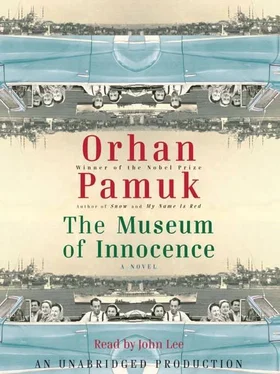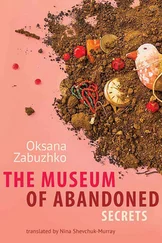The rain that had been pelting down ever faster on the way to the house showed no signs of abating. Tarık Bey had already told me, at the very beginning of the meal, that the neighborhood of Çukurcuma was, as the name implied, a topographical bowl, and that only after buying the house last summer did they learn it had flooded many times in the past, and so I went with him to the bay window to watch the torrent pouring down the hill. Many of their neighbors were out there, with their trousers rolled up and barefoot, using zinc buckets and plastic washtubs to bail out the water rushing over the curbs right into their houses, and arranging piles of stones and rags into makeshift levees. As two barefoot men struggled to clear a blocked grate with their hands, two women, one wearing a green and the other a purple headscarf, were pointing insistently at something in the torrent and shouting. At the table Tarık Bey had commented mysteriously that the sewers dating back to Ottoman times could no longer cope. Whenever the drumming of the rain increased, someone would say something like, “The heavens have opened up,” or “It’s the flood!” or “May God protect us,” and then rise from the table to gaze anxiously through the window at the floodwaters and the neighborhood, now transfigured in the pale lamplight. I, too, felt compelled to rise, in solidarity with their fears of flood, but I was so drunk I was afraid of being unable to stay on my feet, and knocking over tables and chairs.
“I wonder how your driver is doing out there?” said Aunt Nesibe as she gazed out the window.
“Should we get him something to eat?” asked the bridegroom.
“I could take it down,” said Füsun.
But Aunt Nesibe, sensing that I might not like this, changed the subject. For a moment I felt myself to be a lonely drunk under the suspicious scrutiny of the family standing by the bay window. So I faced them and smiled. Just then there was a clatter in the street below-a barrel had overturned-and we heard someone cry in pain. Füsun and I came eye to eye. But she immediately looked away.
How could she manage to show so little interest? This was what I wanted to ask her. But I wasn’t asking this question like some addled abandoned lover, who, when asked why he won’t leave his beloved alone, claims, I just wanted to ask her something! Well, all right, I was.
She’d seen me sitting here alone, so why didn’t she come and sit beside me? Why didn’t she seize this perfect opportunity to explain everything? Again we exchanged glances and again she looked away.
Now Füsun will come to sit at your side, said an optimistic voice inside me. And if she came, it would be a sign that one day she would give up on this misalliance, divorce her husband, and be mine.
The sky rumbled. Füsun drew away from the window and taking five steps floated to the table like a feather to sit across from me in silence.
“I beg you to forgive me,” she said in a whisper that pierced my heart. “I wasn’t able to come to your father’s funeral.”
The blue glare of a lightning bolt flashed between us like a swath of silk in the wind.
“I was waiting for you,” I said.
“I guessed that, but I would never have been able to come,” she said.
“That illegal awning over the grocery shop has been blown off-did you see?” said her husband, Feridun, as he returned to the table.
“We saw that, and it’s a shame,” I said.
“Not a shame at all,” said the father, returning from the window.
Seeing his daughter with her hands over her face, like a girl in tears, he first glanced anxiously at his son-in-law, and then at me.
“I still feel so bad about missing Uncle Mümtaz’s funeral,” said Füsun in a quivering voice. “I loved him so dearly. I was so upset.”
“Füsun loved your father very much,” said Tarık Bey. Passing his daughter, he kissed her head, and when he sat down he raised his eyebrow with a smile and poured me another raki . Then he offered me a handful of cherries.
I was still drunkenly imagining the moment when I would remove from my pocket my father’s velvet box with the pearl earrings, and then the single earring that belonged to Füsun, but that moment never seemed at hand. Churning up inside, I rose to my feet. But I could not stand up to offer her the earrings formally; on the contrary, I had to remain seated. From the way that father and daughter were looking at me, I knew that they, too, were waiting for something. Maybe they wanted me to go, but no, somehow the atmosphere in the room spoke of a deeper sort of anticipation. I dreamed this scene so many times, but in my dreams, of course, Füsun was not married, and just before I offered my presents, I had asked her mother and father for her hand. Now my intoxicated mind could not decide what to do with the earrings in this unforeseen situation.
I told myself that I couldn’t take out the boxes because of my cherry-stained fingers. “May I wash my hands?” I asked. Füsun could no longer ignore the storm raging within me. Feeling her father’s prodding gaze, which said, Show him where to go, daughter! she jumped to her feet in a panic. Seeing her standing before me, my memories of all our rendezvous a year earlier came to full life.
I wanted to embrace her.
We all know how the mind will work on two distinct planes when we’re drunk. On the first plane I was embracing Füsun as in a dream, as if we were meeting in a place beyond time and space. But on the second plane, we were around that table in the house in Çukurcuma, and a voice minding the second plane warned I must not embrace her, that to do so would be disastrous. But because of the rakı , this voice was delayed; instead of coinciding with my dream of embracing Füsun, it came five, six seconds later. During those five, six seconds, my will was free, and precisely for that reason I did not panic, but followed her up the stairs.
The closeness of our bodies, the way we walked upstairs-these too were like things from a dream out of time, and so they would remain in my memory for many years. I saw understanding and disquiet in her glances and I felt grateful to her for the way she expressed her feelings with her eyes. There, once again, it was clear that Füsun and I were made for each other. I had undergone all this anguish on account of this awareness and it did not matter in the least that she was married; just to feel as happy as I did now, climbing up the stairs with her, I was ready to undergo any further torment. To the visitor stubbornly wed to “realism” who cannot suppress a smile at this, having noticed how small that Çukurcuma house is, with the distance between that table and the upstairs bathroom being perhaps four and a half paces, not counting the seventeen steps, let me state with categorical and liberal-minded clarity that I would have readily sacrificed my very life for the happiness I felt during that brief interlude.
After closing the door to the bathroom on the top floor, I decided that my life was no longer in my control, that my connection to Füsun had shaped it into something beyond my free will. Only by believing this could I be happy, could I indeed bear to live. On the little tray before the mirror bearing Füsun’s, Aunt Nesibe’s, and Uncle Tarık’s toothbrushes, as well as shaving soap, brush, and razor, I saw Füsun’s lipstick. I picked it up and sniffed it, then put it into my pocket. I efficiently sniffed the towels hanging on the rack but detected nothing as I remembered it: Clean ones had evidently been put out in expectation of my visit. As I surveyed the small toilet, searching for one other object that might offer me consolation during the difficult days awaiting me after I’d left this place, I saw myself in the mirror, and from my expression I had a shocking intimation of the rift between my body and my soul. Whereas my face was drained by defeat and shock, inside my head was another universe: I now understood as an elemental fact of life that while I was here, inside my body was a soul, a meaning, that all things were made of desire, touch, and love, that what I was suffering was composed of the same elements. Between the howling of the rain and the gurgling of the water pipes, I heard one of the old Turkish songs that, in my childhood, would make my grandmother so happy whenever she heard it. There had to be a radio nearby. Between the low moan of the lute and the joyous chatter of the kanun was a tired but hopeful female voice, coming to me through the bathroom’s half-open window, saying, “It’s love, it’s love, the reason for everything in the universe.” With the help of this singer, I thus lived through one of my life’s most profoundly spiritual moments standing in front of the bath-room mirror; the universe was one, and one with all inside it. It wasn’t just all the objects in the world-the mirror in front of me, the plate of cherries, the bathroom’s bolt (which I display here), and Füsun’s hairpin (which I thankfully noticed and dropped into my pocket)-all humanity was one, too. To understand the meaning of this life, one first had to be compelled to see this unity by the force of love.
Читать дальше












